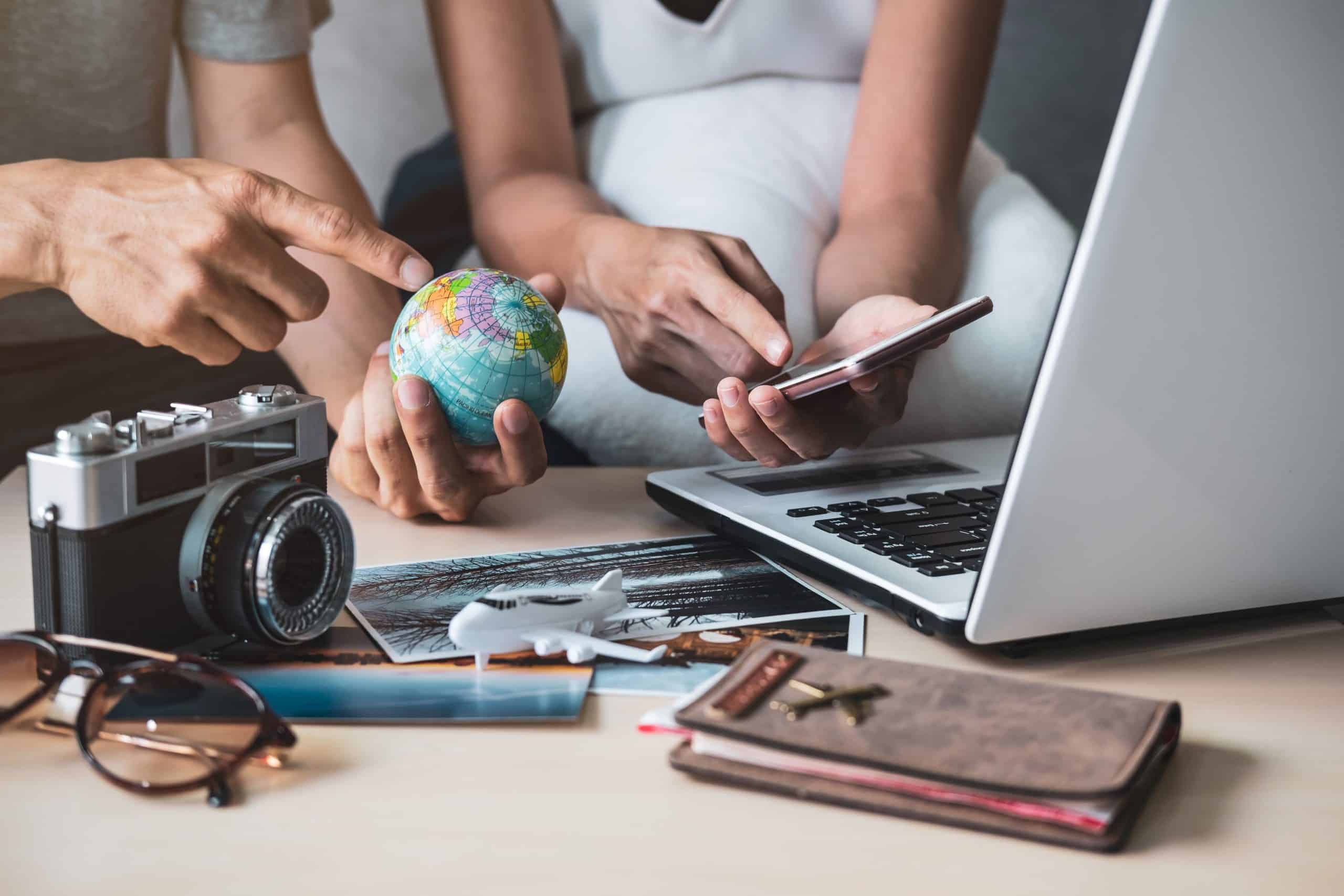
Heading Out on Summer Vacation? Follow These 6 Tips for Online Safety

You know all about how to lock down your home when you go out of town. You’d never go on vacation, for instance, and leave your front door unlocked. You know it’s important to have someone check your mail while you’re away so it looks like you’re still at home.
But what about your online safety while you’re on vacation? After all, hackers don’t take a holiday just because you do. You’re just as vulnerable – maybe even more vulnerable – to cyberattacks when you’re on vacation as you are when you’re at home.
Keeping yourself safe shouldn’t leave you fretting and anxious about what could go wrong. What we’ve got, then, is six simple tips for improving your online safety when you’re on vacation — with the emphasis on “simple.” You can take care of most of these before you even leave town.
Six Tips to Keep You Safe Online While You’re on Vacation
Whether you’re driving the family to the Grand Canyon, lounging with your partner on a beach in Maui, or jetting off on your own to see the Eiffel Tower in Paris, you don’t have time for complicated security regimes. You need easy ways to keep yourself safe that let you relax and enjoy yourself. With that in mind, here are six things you can do that take almost no extra work but will raise your online security profile no matter where in the world you might be headed.
1. Use a VPN to Avoid Public Wi-Fi
It’s nice that restaurants and hotels offer free Wi-Fi now. In some places in the world, whole towns are even set up so you can get a signal anywhere you go. The problem is, public Wi-Fi isn’t always safe.
For one thing, whoever you’re getting that Wi-Fi from may be monitoring your activity. Worse still, if the network is not 100 percent secure, other users on the network may be able to see what you’re up to as well, including what sites you visit and what information you send.1 Maybe that’s OK if you’re just listening to tunes on Spotify, but it can be a big problem if you’re doing a little online banking, shopping at Amazon, or trading confidential files with the office.
The solution is to install a virtual private network (VPN) on all your devices. A VPN routes your connection through a secure server so no one can see what you’re up to. In addition, the best VPNs assign you an untraceable IP address so everything you do online is completely anonymous. Installing a VPN takes less than 10 minutes and you don’t have to worry about it after that. Just choose to connect through the VPN anytime you’re using public Wi-Fi.
2. Don’t Share Your Adventures Until You’re Home
Sure, you’re excited about your vacation. You’re seeing some amazing sights, and with your new beach tan you’ve never looked better. It’s tempting, then, to post a running social media commentary about your adventures.
Keep in mind, though, that when you post those holiday snaps, you alert everyone online to the fact that you’re away from home. Even if you’ve taken the time to set your privacy settings so that only friends see your posts, you can’t be sure when one of those friends might repost one of your pictures. When would-be home invaders know you’re out of town, it’s practically an invitation to break in.
Of course, investing in one of the best home security systems can help minimize the possibility of an attempted break-in, but you’re better off if thieves don’t know you’re gone at all. The solution is simple: just wait until you’re back home to tell everyone how you wish they’d been there.
3. Lock Down Your Devices and Accounts
What’s the most direct way for an identity thief to get hold of your PII (Personal Identifiable Information)? Steal one of your devices. Every year millions of cellphones are either lost or stolen. Pickpockets are particularly active in large cities and in places where many of us like to visit when we go on vacation.
A lost or stolen phone doesn’t have to be a problem, though, if you make sure to lock your devices. Pin codes, passwords, thumb print scans, and facial recognition software can all help to ensure that your information won’t be vulnerable if your smartphone should go missing.
And while you’re locking down your phones, consider updating your passwords to make them safer. Our own research into passwords indicates that far too many of us have bad password habits like using shorter passwords, reusing passwords, and sharing them with others. It’s a good idea to update your accounts with all-new passwords before you go on vacation to ensure everything is completely secure. In addition, use multi-factor identification methods when they’re offered so that even if someone should manage to figure out your password, they still won’t be able to access your device.
Finally, consider turning on your devices’ tracking programs so you can figure out where they might be if they wind up stolen.
4. Install Antivirus Software on All Your Devices
Strong passwords may not be enough protection for your devices if you manage to pick up some malware. Once someone has access to your phone, laptop, or tablet via a virus, they can easily gain access not just to your personal data but to even more sensitive information like your passwords and account numbers.
You can pick up malware when you’re using public Wi-Fi or visiting unsecured websites and never even know you’re infected. If you’ve installed effective antivirus software, though, it will not only prevent you from picking up a virus or other malware but alert you in case you’ve already been infected.
5. Avoid Using Public Computers
With the widespread use of smartphones, internet cafes aren’t nearly as popular as they once were. Still, many people use them when they’re on vacation. They allow you to leave your bulky laptop at home and still check in with work if you really need to.
Unfortunately, you can’t know what sorts of tracking software might be lurking on these unsecured computers. It isn’t just that the cafe or hotel where you’re using the device might be keeping track of your activities. Any user could install tracking malware on one of these computers, software that records keystrokes, and gather all your passwords at one time. All they need to do is drop by once a week or so and download this information.
The very best policy is to avoid using any public devices. After all, you’re on vacation. Resist the temptation to log in to work. If you think you’re going to be tempted, though, it’s better to bring the laptop with you so you can be sure your online travels are absolutely secure.
6. Don’t Store Documents on Your Devices
Any of the bad things that can happen to your devices when you’re on vacation can expose your personal and professional documents to identity thieves and other cyber criminals. Maybe you read, for instance, about the Japanese government employee who lost a flash drive recently, containing personal details about every person in his city.2
Again, the solution is relatively simple. Use the cloud to store documents and other sensitive information rather than storing them directly on your device. If you should lose your device, no one will be able to see what you’ve been working on. As a bonus, you’ll have access to your work no matter where you go, since it will always be available in the cloud.
What Are the Cyber Threats When You’re Away From Home?
Why are these six tips so important? Just what kind of cyber threats are you vulnerable to when you’re on vacation, and how can these tips help?
Lost or stolen device: A stolen device can be a headache for many reasons. Obviously, you lose lots of valuable data. Worse still, that data can fall into the wrong hands and you could be the victim of identity theft and financial fraud.
- Lock down your devices so your information is more secure.
- Don’t keep documents on your devices; store them in the cloud instead.
- Turn on your phone’s geo-tracker to make it easier to find your phone should you lose it.
Malware: When you’re away from home you’re more likely to use public Wi-Fi. That exposes you to the risk of picking up malware.
- Install antivirus software to minimize the risk.
- Use a VPN anytime you’re away from your home network.
Identity theft: Make no mistake: Identity thieves love to hang out in popular tourist destinations. They know that when you’re on vacation you’re more likely to let your guard down. It’s easier to grab your cell phone, track your movements online, install malware on your device, or steal your data from publicly available computers.
- Make sure you’re using a good VPN and good antivirus software.
- Lock your device down and use strong passwords. Use only your own devices to get online.
Surveillance: Keep in mind that when you’re online you’re not just vulnerable to hackers and identity thieves. Many world governments think nothing of monitoring any devices that happen to be within their borders. If you’re not using a VPN to shield your device from prying eyes, anyone could be watching. In fact, in some places you could be leaving yourself open to arrest for visiting sites that are perfectly legal in your home country.
- Use a VPN anytime you’re online in a foreign country.
- Lock your devices so no one can access them even if you should lose them.
Trouble at home: Finally, your online activities can put your home at risk if you aren’t careful. Any details you share about your vacation while you’re out of town lets thieves know your home is sitting empty.
- Make sure you wait to share this kind of information until you’re home.
- Ask your friends and family not to post about your trip either.
Final Words
Here’s the bottom line: It’s a dangerous world out there. You probably know about the physical dangers. You know you have to take measures to protect your home when you’re away. You know you have to take precautions when you’re traveling, like using traveler’s checks, carrying your money in your front pockets, and never leaving valuables in your hotel rooms when you’re out. We don’t always think about the dangers of the virtual world, though. The fact is, when you’re on vacation you’re at risk of everything from hacking to government surveillance.
So, before you head out on your journey, don’t just take the time to make sure you’ve packed enough snacks for the road and arm your home security system. Take a little time to prepare your devices too. Lock them down, install VPNs and antivirus software, and update your passwords. You’ve been looking forward to this trip for weeks, maybe even months; don’t let lax online security habits ruin it.
FTC. (2021). How To Safely Use Public Wi-Fi Networks.
consumer.ftc.gov/articles/how-safely-use-public-wi-fi-networks#BBC. (2022). Japanese man loses USB stick with entire city's personal details.
bbc.com/news/world-asia-61921222

